Fleurs du Mal Magazine


Or see the index
 The Sorrows of Young Werther (31) by J.W. von Goethe ♦ AUGUST 28. ♦ If my ills would admit of any cure, they would certainly be cured here. This is my birthday, and early in the morning I received a packet from Albert. Upon opening it, I found one of the pink ribbons which Charlotte wore in her dress the first time I saw her, and which I had several times asked her to give me. With it were two volumes in duodecimo of Wetstein’s “Homer,” a book I had often wished for, to save me the inconvenience of carrying the large Ernestine edition with me upon my walks. You see how they anticipate my wishes, how well they understand all those little attentions of friendship, so superior to the costly presents of the great, which are humiliating. I kissed the ribbon a thousand times, and in every breath inhaled the remembrance of those happy and irrevocable days which filled me with the keenest joy. Such, Wilhelm, is our fate. I do not murmur at it: the flowers of life are but visionary. How many pass away, and leave no trace behind–how few yield any fruit–and the fruit itself, how rarely does it ripen! And yet there are flowers enough! and is it not strange, my friend, that we should suffer the little that does really ripen, to rot, decay, and perish unenjoyed? Farewell! This is a glorious summer. I often climb into the trees in Charlotte’s orchard, and shake down the pears that hang on the highest branches. She stands below, and catches them as they fall.
The Sorrows of Young Werther (31) by J.W. von Goethe ♦ AUGUST 28. ♦ If my ills would admit of any cure, they would certainly be cured here. This is my birthday, and early in the morning I received a packet from Albert. Upon opening it, I found one of the pink ribbons which Charlotte wore in her dress the first time I saw her, and which I had several times asked her to give me. With it were two volumes in duodecimo of Wetstein’s “Homer,” a book I had often wished for, to save me the inconvenience of carrying the large Ernestine edition with me upon my walks. You see how they anticipate my wishes, how well they understand all those little attentions of friendship, so superior to the costly presents of the great, which are humiliating. I kissed the ribbon a thousand times, and in every breath inhaled the remembrance of those happy and irrevocable days which filled me with the keenest joy. Such, Wilhelm, is our fate. I do not murmur at it: the flowers of life are but visionary. How many pass away, and leave no trace behind–how few yield any fruit–and the fruit itself, how rarely does it ripen! And yet there are flowers enough! and is it not strange, my friend, that we should suffer the little that does really ripen, to rot, decay, and perish unenjoyed? Farewell! This is a glorious summer. I often climb into the trees in Charlotte’s orchard, and shake down the pears that hang on the highest branches. She stands below, and catches them as they fall.
The Sorrows of Young Werther (Die Leiden des jungen Werther) by J.W. von Goethe. Translated by R.D. Boylan
To be continued
fleursdumal.nl magazine for art & literature
More in: -Die Leiden des jungen Werther, Goethe, Johann Wolfgang von
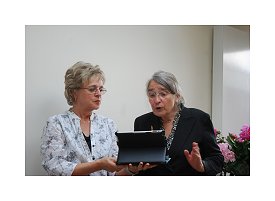
Emma Crebolder (R) & Heilna du Plooy (L)
Vertaalvrucht (nr 3): Emma Crebolder & Heilna du Plooy
Literaire Salon in’t Wevershuisje 3
Ons vruchtbaarst verleden
Ons vruchtbaarst verleden lag
in geschriften en bij rivieren, op
keien of stenen aan Schelde of Waal.
De stroming sleepte ons mee.
We moesten de verhalen vinden.
Schorrevaar is achtergebleven. Ze
speelt met uitgeklapte vleugels voor
boek. Ze omvangt de meeuw en
gooit haar trots mijlenver op en wijst,
kijk daar: vriendin van schorrevaar.
Emma Crebolder
Ons vrugbaarste verlede
Ons vrugbaarste verlede is op papier
en langs riviere vasgelê, op die keie
of klippe langs die Schelde of die Waal.
Die stroming het ons meegevoer.
Ons moes na die verhale soek.
Waterraaf het agtergebly. Sy flap
haar vlerke soos ’n boek wyd oop.
Sy omhels die meeu en gooi haar
trots hoog op in die lug en wys,
kyk daar: die vriendin van waterraaf.
Heilna du Plooy
Vertaling naar het Zuidafrikaans
Vertaalvrucht (nr 3): Emma Crebolder & Heilna du Plooy
Literaire Salon in’t Wevershuisje 3, foto Carina van der Walt
Gedicht en vertaling eerder gepubliceerd in Literair Tijdschrift Ambrozijn, Brugge
fleursdumal.nl magazine
More in: Archive C-D, Crebolder, Emma, Heilna du Plooy, Literaire Salon in 't Wevershuisje, LITERARY MAGAZINES
Acht vertalingen van gedichten van T.T. Cloete (1924) door Carina van der Walt & Geno Spoormans
T.T. Cloete
rokke
juwele die onthou ek eintlik nie
van hoede toentertyd met tulle
onthou ek vaag maar rokke
so baie helderte het ek van húlle
daar was die houtskoolrok
met loodgrijs kolle Tarentaal
die een met troupantkleure
haar naam was Fluister-Asemhaal-
van-Blomme as jy loop
of hier en daar selfs in ’n stoel
doodstil rondsit
die bloue was My-Hartklop-Voel-
Onder-My-Bors
die swart-en-wit gestreepte een Sebra
vir meestal saans
met uitgaan dra
en dan die Pronksingvink
die een met swart-en-geel
sy hang ’n graspluim in die wind
wat oor haar saggies streel
daar was die nuwerwetse een
met ingeweefde kreuk
hoe mens haar ook al was of stryk
met byna vleeslik haar eksoties Vreemde Reuk
een was ’n hele Ruim Landskap
die lemmetjiegroene
vol grasveld water sonne geel
lemoene
en toe jy kwalik was en skuifelend
het ons ’n nuwe wéér gekoop
en lieg-lieg-lag-lag het ons haar
Stilstreel-Saggies-Soen gedoop
en dan was daar ’n allerlaaste een
ontwerp deur hartseerliefde nee
so menslik op ons afgedwing
te onvertaalbaar nee
om haar ’n naam te gee
T.T. Cloete
jurken
juwelen herinner ik me eigenlijk niet
hoeden met tule toentertijd
onthoud ik vaag maar jurken
staan mij voor ogen in volle helderheid
er was een houtskooljurk
met loodgrijze stippen Parelhoen
een scharrelaar vol bonte kleuren
haar naam was Nog-Zachter-Doen-
dan-Bloemen als je liep
of hier en daar zelfs in stoelen
doodstil wat rondhing
de blauwe was Mijn-Hartslag-Voelen-
Onder-Mijn-Borst
de zwart-wit gestreepte Zebra
meestal voor ’s avonds
bij een gala
en dan de Pronkzingvink
die ene in zwarten en gelen
zij hangt als rietpluimen in de wind
die zachtjes over haar strelen
dan was er eentje niet te strijken
van een hoogst modern tailleur
met ingeweven kreuken
en haar bijna lijfelijk exotische Vreemde Geur
een was een heel Ruim Landschap
het limoengroene
veld vol gras water zon en gele
citroenen
en toen je nog maar kwalijk was en schuifelde
hebben we wéér een nieuwe gehaald
en steels stout hebben we haar
als Stilletjes-Zachtjes-Zoenen vertaald
en dan was er de allerlaatste
ontworpen door treurliefde nee
zo doodgewoon aan het leven
te onvertaalbaar
om haar een naam te geven
T.T. Cloete 8 gedichten: Vertalingen uit het Zuid-Afrikaans door Carina van der Walt & Geno Spoormans, 2010 – slot gedicht 1-8
fleursdumal.nl magazine
More in: Archive C-D, T .T. Cloete, Walt & Spoormans
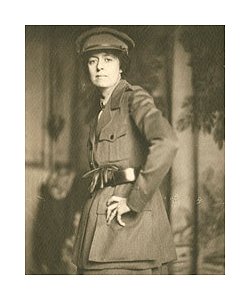
Eunice Tietjens
(1884 – 1944)
The Dandy
He swaggers in green silk and his two coats are lined
with fur. Above his velvet shoes his trim, bound
ankles twinkle pleasantly.
His nails are of the longest.
Quite the glass of fashion is Mr. Chu!
In one slim hand–the ultimate punctilio–dangles
a bamboo cage, wherein a small brown bird sits
with a face of perpetual surprise.
Mr. Chu smiles the benevolent smile of one who satisfies
both fashion and a tender heart.
Does not a bird need an airing?
(Wusih)
Eunice Tietjens poetry
fleursdumal.nl magazine
More in: Archive S-T, Tietjens, Eunice
 The Sorrows of Young Werther (30) by J.W. von Goethe ♦ AUGUST 21. ♦ In vain do I stretch out my arms toward her when I awaken in the morning from my weary slumbers. In vain do I seek for her at night in my bed, when some innocent dream has happily deceived me, and placed her near me in the fields, when I have seized her hand and covered it with countless kisses. And when I feel for her in the half confusion of sleep, with the happy sense that she is near, tears flow from my oppressed heart; and, bereft of all comfort, I weep over my future woes.
The Sorrows of Young Werther (30) by J.W. von Goethe ♦ AUGUST 21. ♦ In vain do I stretch out my arms toward her when I awaken in the morning from my weary slumbers. In vain do I seek for her at night in my bed, when some innocent dream has happily deceived me, and placed her near me in the fields, when I have seized her hand and covered it with countless kisses. And when I feel for her in the half confusion of sleep, with the happy sense that she is near, tears flow from my oppressed heart; and, bereft of all comfort, I weep over my future woes.
♦ AUGUST 22. ♦ What a misfortune, Wilhelm! My active spirits have degenerated into contented indolence. I cannot be idle, and yet I am unable to set to work. I cannot think: I have no longer any feeling for the beauties of nature, and books are distasteful to me. Once we give ourselves up, we are totally lost. Many a time and oft I wish I were a common labourer; that, awakening in the morning, I might have but one prospect, one pursuit, 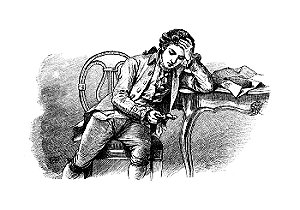 one hope, for the day which has dawned. I often envy Albert when I see him buried in a heap of papers and parchments, and I fancy I should be happy were I in his place. Often impressed with this feeling I have been on the point of writing to you and to the minister, for the appointment at the embassy, which you think I might obtain. I believe I might procure it. The minister has long shown a regard for me, and has frequently urged me to seek employment. It is the business of an hour only. Now and then the fable of the horse recurs to me. Weary of liberty, he suffered himself to be saddled and bridled, and was ridden to death for his pains. I know not what to determine upon. For is not this anxiety for change the consequence of that restless spirit which would pursue me equally in every situation of life?
one hope, for the day which has dawned. I often envy Albert when I see him buried in a heap of papers and parchments, and I fancy I should be happy were I in his place. Often impressed with this feeling I have been on the point of writing to you and to the minister, for the appointment at the embassy, which you think I might obtain. I believe I might procure it. The minister has long shown a regard for me, and has frequently urged me to seek employment. It is the business of an hour only. Now and then the fable of the horse recurs to me. Weary of liberty, he suffered himself to be saddled and bridled, and was ridden to death for his pains. I know not what to determine upon. For is not this anxiety for change the consequence of that restless spirit which would pursue me equally in every situation of life?
The Sorrows of Young Werther (Die Leiden des jungen Werther) by J.W. von Goethe. Translated by R.D. Boylan
To be continued
fleursdumal.nl magazine for art & literature
More in: -Die Leiden des jungen Werther, Goethe, Johann Wolfgang von

Rob Stuart: Mind the Gap
fleursdumal.nl magazine
More in: *Concrete + Visual Poetry P-T, Rob Stuart, Rob Stuart, Stuart, Rob

Heinrich Heine
(1797-1856)
An einen politischen Dichter
Du singst, wie einst Tyrtäus sang,
Von Heldenmut beseelet,
Doch hast du schlecht dein Publikum
Und deine Zeit gewählet.
Beifällig horchen sie dir zwar,
Und loben, schier begeistert:
Wie edel dein Gedankenflug,
Wie du die Form bemeistert.
Sie pflegen auch beim Glase Wein
Ein Vivat dir zu bringen
Und manchen Schlachtgesang von dir
Lautbrüllend nachzusingen.
Der Knecht singt gern ein Freiheitslied
Des Abends in der Schenke:
Das fördert die Verdauungskraft,
Und würzet die Getränke.
Heinrich Heine poetry
fleursdumal.nl magazine
More in: Archive G-H, Heine, Heinrich
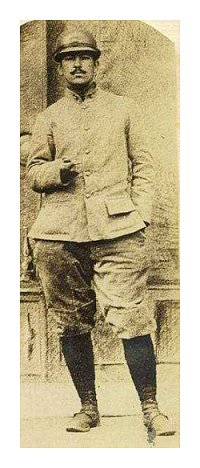
Alan Seeger
(1888-1916)
Ode in Memory of the American Volunteers Fallen for France
I
Ay, it is fitting on this holiday,
Commemorative of our soldier dead,
When–with sweet flowers of our New England May
Hiding the lichened stones by fifty years made gray —
Their graves in every town are garlanded,
That pious tribute should be given too
To our intrepid few
Obscurely fallen here beyond the seas.
Those to preserve their country’s greatness died;
But by the death of these
Something that we can look upon with pride
Has been achieved, nor wholly unreplied
Can sneerers triumph in the charge they make
That from a war where Freedom was at stake
America withheld and, daunted, stood aside.
II
Be they remembered here with each reviving spring,
Not only that in May, when life is loveliest,
Around Neuville-Saint-Vaast and the disputed crest
Of Vimy, they, superb, unfaltering,
In that fine onslaught that no fire could halt,
Parted impetuous to their first assault;
But that they brought fresh hearts and springlike too
To that high mission, and ’tis meet to strew
With twigs of lilac and spring’s earliest rose
The cenotaph of those
Who in the cause that history most endears
Fell in the sunny morn and flower of their young years.
III
Yet sought they neither recompense nor praise,
Nor to be mentioned in another breath
Than their blue coated comrades whose great days
It was their pride to share–ay, share even to the death!
Nay, rather, France, to you they rendered thanks
(Seeing they came for honor, not for gain),
Who, opening to them your glorious ranks,
Gave them that grand occasion to excel,
That chance to live the life most free from stain
And that rare privilege of dying well.
IV
O friends! I know not since that war began
From which no people nobly stands aloof
If in all moments we have given proof
Of virtues that were thought American.
I know not if in all things done and said
All has been well and good,
Or if each one of us can hold his head
As proudly as he should,
Or, from the pattern of those mighty dead
Whose shades our country venerates to-day,
If we’ve not somewhat fallen and somewhat gone astray.
But you to whom our land’s good name is dear,
If there be any here
Who wonder if her manhood be decreased,
Relaxed its sinews and its blood less red
Than that at Shiloh and Antietam shed,
Be proud of these, have joy in this at least,
And cry: “Now heaven be praised
That in that hour that most imperilled her,
Menaced her liberty who foremost raised
Europe’s bright flag of freedom, some there were
Who, not unmindful of the antique debt,
Came back the generous path of Lafayette;
And when of a most formidable foe
She checked each onset, arduous to stem —
Foiled and frustrated them —
On those red fields where blow with furious blow
Was countered, whether the gigantic fray
Rolled by the Meuse or at the Bois Sabot,
Accents of ours were in the fierce melee;
And on those furthest rims of hallowed ground
Where the forlorn, the gallant charge expires,
When the slain bugler has long ceased to sound,
And on the tangled wires
The last wild rally staggers, crumbles, stops,
Withered beneath the shrapnel’s iron showers: —
Now heaven be thanked, we gave a few brave drops;
Now heaven be thanked, a few brave drops were ours.”
V
There, holding still, in frozen steadfastness,
Their bayonets toward the beckoning frontiers,
They lie–our comrades–lie among their peers,
Clad in the glory of fallen warriors,
Grim clusters under thorny trellises,
Dry, furthest foam upon disastrous shores,
Leaves that made last year beautiful, still strewn
Even as they fell, unchanged, beneath the changing moon;
And earth in her divine indifference
Rolls on, and many paltry things and mean
Prate to be heard and caper to be seen.
But they are silent, calm; their eloquence
Is that incomparable attitude;
No human presences their witness are,
But summer clouds and sunset crimson-hued,
And showers and night winds and the northern star.
Nay, even our salutations seem profane,
Opposed to their Elysian quietude;
Our salutations calling from afar,
From our ignobler plane
And undistinction of our lesser parts:
Hail, brothers, and farewell; you are twice blest, brave hearts.
Double your glory is who perished thus,
For you have died for France and vindicated us.
Alan Seeger: Ode in Memory of the American Volunteers Fallen for France
(To have been read before the statue of Lafayette and Washington in Paris, on Decoration Day, May 30, 1916.)
fleursdumal.nl magazine
More in: Archive S-T, Seeger, Alan
Kate Tempest: Brand New Ancients On Film
– Part 3 –
In November 2013, performance poet Kate Tempest and Battersea Arts Centre, embarked on a journey together to tour the award winning show Brand New Ancients.
The tour includes 9 London venues including the Royal Opera House, Harrow Arts Centre, Lyric Hammersmith and Battersea Arts Centre, as well as 5 regional venues across the country from Contact in Manchester to Brighton Dome as well as heading to New York at St. Ann’s Warehouse.
In collaboration with director Joe Roberts, Battersea Arts Centre has produced three short films interpreting Kate’s spoken word through moving image, which will be released across the tour.
This is the third of the three part series:
Part one can be found here: http://www.youtube.com/watch?v=JLWlB3ib7ZM
Part two can be found here: http://www.youtube.com/watch?v=UpqJZrVwZTw
Directed by Joe Roberts
Drawings by Mista Breakfast
Movement and composition by Berkavitch.
Produced by Battersea Arts Centre
Brand New Ancients is written by Kate Tempest
A Kate Tempest & Battersea Arts Centre Co-production
Co-commissioned by the Albany
More info and tickets: # http://brandnewancientstour.com/
15 apr. 2014
kate tempest poetry
fleursdumal.nl magazine
More in: Archive S-T, AUDIO, CINEMA, RADIO & TV, Kate/Kae Tempest, Tempest, Kate/Kae
 The Sorrows of Young Werther (29) by J.W. von Goethe ♦ AUGUST 18. ♦ Must it ever be thus,–that the source of our happiness must also be the fountain of our misery? The full and ardent sentiment which animated my heart with the love of nature, overwhelming me with a torrent of delight, and which brought all paradise before me, has now become an insupportable torment, a demon which perpetually pursues and harasses me. When in bygone days I gazed from these rocks upon yonder mountains across the river, and upon the green, flowery valley before me, and saw all nature budding and bursting around; the hills clothed from foot to peak with tall, thick forest trees; the valleys in all their varied windings, shaded with the loveliest woods; and the soft river gliding along amongst the lisping reeds, mirroring the beautiful clouds which the soft evening breeze wafted across the sky,–when I heard the groves about me melodious with the music of birds, and saw the million swarms of insects dancing in the last golden beams of the sun, whose setting rays awoke the humming beetles from their grassy beds, whilst the subdued tumult around directed my attention to the ground, and I there observed the arid rock compelled to yield nutriment to the dry moss, whilst the heath flourished upon the barren sands below me, all this displayed to me the inner warmth which animates all nature, and filled and glowed within my heart. I felt myself exalted by this overflowing fulness to the perception of the Godhead, and the glorious forms of an infinite universe became visible to my soul!
The Sorrows of Young Werther (29) by J.W. von Goethe ♦ AUGUST 18. ♦ Must it ever be thus,–that the source of our happiness must also be the fountain of our misery? The full and ardent sentiment which animated my heart with the love of nature, overwhelming me with a torrent of delight, and which brought all paradise before me, has now become an insupportable torment, a demon which perpetually pursues and harasses me. When in bygone days I gazed from these rocks upon yonder mountains across the river, and upon the green, flowery valley before me, and saw all nature budding and bursting around; the hills clothed from foot to peak with tall, thick forest trees; the valleys in all their varied windings, shaded with the loveliest woods; and the soft river gliding along amongst the lisping reeds, mirroring the beautiful clouds which the soft evening breeze wafted across the sky,–when I heard the groves about me melodious with the music of birds, and saw the million swarms of insects dancing in the last golden beams of the sun, whose setting rays awoke the humming beetles from their grassy beds, whilst the subdued tumult around directed my attention to the ground, and I there observed the arid rock compelled to yield nutriment to the dry moss, whilst the heath flourished upon the barren sands below me, all this displayed to me the inner warmth which animates all nature, and filled and glowed within my heart. I felt myself exalted by this overflowing fulness to the perception of the Godhead, and the glorious forms of an infinite universe became visible to my soul!  Stupendous mountains encompassed me, abysses yawned at my feet, and cataracts fell headlong down before me; impetuous rivers rolled through the plain, and rocks and mountains resounded from afar. In the depths of the earth I saw innumerable powers in motion, and multiplying to infinity; whilst upon its surface, and beneath the heavens, there teemed ten thousand varieties of living creatures. Everything around is alive with an infinite number of forms; while mankind fly for security to their petty houses, from the shelter of which they rule in their imaginations over the wide-extended universe. Poor fool! in whose petty estimation all things are little. From the inaccessible mountains, across the desert which no mortal foot has trod, far as the confines of the unknown ocean,breathes the spirit of the eternal Creator; and every atom to which he has given existence finds favour in his sight. Ah, how often at that time has the flight of a bird, soaring above my head, inspired me with the desire of being transported to the shores of the immeasurable waters, there to quaff the pleasures of life from the foaming goblet of the Infinite, and to partake, if but for a moment even, with the confined powers of my soul, the beatitude of that Creator who accomplishes all things in himself, and through himself!
Stupendous mountains encompassed me, abysses yawned at my feet, and cataracts fell headlong down before me; impetuous rivers rolled through the plain, and rocks and mountains resounded from afar. In the depths of the earth I saw innumerable powers in motion, and multiplying to infinity; whilst upon its surface, and beneath the heavens, there teemed ten thousand varieties of living creatures. Everything around is alive with an infinite number of forms; while mankind fly for security to their petty houses, from the shelter of which they rule in their imaginations over the wide-extended universe. Poor fool! in whose petty estimation all things are little. From the inaccessible mountains, across the desert which no mortal foot has trod, far as the confines of the unknown ocean,breathes the spirit of the eternal Creator; and every atom to which he has given existence finds favour in his sight. Ah, how often at that time has the flight of a bird, soaring above my head, inspired me with the desire of being transported to the shores of the immeasurable waters, there to quaff the pleasures of life from the foaming goblet of the Infinite, and to partake, if but for a moment even, with the confined powers of my soul, the beatitude of that Creator who accomplishes all things in himself, and through himself!
My dear friend, the bare recollection of those hours still consoles me. Even this effort to recall those ineffable sensations, and give them utterance, exalts my soul above itself, and makes me doubly feel the intensity of my present anguish.
It is as if a curtain had been drawn from before my eyes, and, instead of prospects of eternal life, the abyss of an ever open grave yawned before me. Can we say of anything that it exists when all passes away, when time, with the speed of a storm, carries all things onward,–and our transitory existence, hurried along by the torrent, is either swallowed up by the waves or dashed against the rocks? There is not a moment but preys upon you,–and upon all around you, not a moment in which you do not yourself become a destroyer. The most innocent walk deprives of life thousands of poor insects: one step destroys the fabric of the industrious ant, and converts a little world into chaos. No: it is not the great and rare calamities of the world, the floods which sweep away whole villages, the earthquakes which swallow up our towns, that affect me. My heart is wasted by the thought of that destructive power which lies concealed in every part of universal nature. Nature has formed nothing that does not consume itself, and every object near it: so that, surrounded by earth and air, and all the active powers, Iwander on my way with aching heart; and the universe is to me a fearful monster, for ever devouring its own offspring.
The Sorrows of Young Werther (Die Leiden des jungen Werther) by J.W. von Goethe. Translated by R.D. Boylan
To be continued
fleursdumal.nl magazine for art & literature
More in: -Die Leiden des jungen Werther, Goethe, Johann Wolfgang von

Afgemat vosje
Ha, wat schudde hij die stomme honden
toch weer makkelijk van zich af. Zijn tong
glanst vochtig als deze bessenstruik.
Hoe trilt de weke flank na van die straffe
draf, de angst nog in zijn buik. Het gezin
liet hij stil in een hol in slaap, de jongen
zacht tegen zijn wijfje aan. Wat verlangt de rekel
naar haar warme lijfje. Maar in avondschemer
houdt het verre meutejanken hem voorlopig in
dicht kreupelhout. Dit is míjn woud, dit zijn mijn
bomen. Blijf van al mijn mooie holle wegen weg
toch, denkt de vos. En snakt naar lange rosse dromen.
Bert Bevers
Verschenen in Die felle…. – Gedichten over vossen, Uitgeverij Gianni, Maastricht, 2005
fleursdumal.nl magazine
More in: Archive A-B, Bevers, Bert
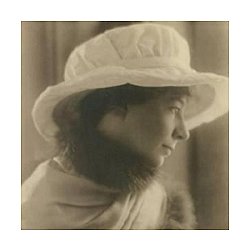
Sara Teasdale
(1884 – 1933)
Swans
Night is over the park, and a few brave stars
Look on the lights that link it with chains of gold,
The lake bears up their reflection in broken bars
That seem too heavy for tremulous water to hold.
We watch the swans that sleep in a shadowy place,
And now and again one wakes and uplifts its head;
How still you are–your gaze is on my face–
We watch the swans and never a word is said.
Sara Teasdale poetry
fleursdumal.nl magazine
More in: Archive S-T, MUSEUM OF NATURAL HISTORY - department of ravens & crows, birds of prey, riding a zebra, spring, summer, autumn, winter, Teasdale, Sara
Thank you for reading Fleurs du Mal - magazine for art & literature